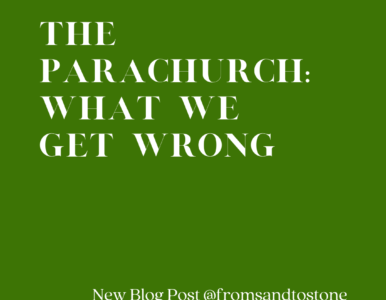Over time care for people slowly transitioned from being fully a function within the Christian Church to primarily being a mechanism of non-profit organizations. There have been many well-intentioned people along the way that have formed what we call parachurch organizations, or Christian nonprofits. These nonprofits do a lot of great work for our society, but they also receive a lot of critique from church leaders and often rightfully so. Recently I read a book that spoke truth but was also a bit hard on parachurch organizations and as someone who has worked in a parachurch organization for eight years, I thought I’d enter the dialogue and provide my own assessment on the bad and good of parachurch organizations. Let’s start with what many Christian nonprofits are missing the mark on. There’s much to be said here, but I’ll keep my thoughts brief.
They are made of Christians but not Christian
Most people assume that if an organization is made up of Christians that it is has a Christian mission. This couldn’t be further from the truth. At best some organizations are just doing good humanitarian work without Jesus involved and at the worst Christians are participating in activities that don’t even line up with Scripture. At the core, too many parachurch organizations don’t preach the Gospel and they don’t see it as relevant to addressing our biggest needs in society. Caught up in flashy terms and evidence-based practices, too many well-meaning Christians don’t incorporate the transforming power of the Gospel into their care of people. Parachurch organizations needs to bring back the power of Gospel and stop separating people’s physical and spiritual needs. People are mind, body and spirit.
Falling out of love with the Church
Too many parachurch organizations have fallen out of love with the Church. Unfortunately, we are no longer working alongside the church, as the word para would infer. Instead, many nonprofits communicate to churches to get out of their way and allow the experts to lead the way. We forget that the Church is the expert, we exist for the Church not vice versa. I get it, churches can be awfully frustrating. They have slow processes for decision making and they may not be passionate about your mission because they focus on a different demographic. The world needs the church. It is the church that was given the Great Commission and the instructions to meet the biggest needs of the world. We can’t be so impatient and proud of our expertise that we disregard the vital role of the local Church and move past them.
Money makes Mission Drift
I wish that the saying, follow the money wasn’t so true, yet it is. There is a lot of pressure in the nonprofit world to secure funding to keep all your programs going. A common issue is what is called mission drift, this happens when you start to take in funding that has different strings attached about how and who you serve. The easiest example is taking government funding, there is not faster way to lose your ability to preach the Gospel than to begin taking government grants. The problem is, when individual and corporate giving aren’t enough to do all you want as an organization, you have to get your money from somewhere and big government grants looks mighty tempting. Nonprofits can also catch themselves with mission drift from local foundations or even large individual donors who have specific areas of interest and ways they’d like their money used. This is a trust God area for nonprofits, will we trust God enough to supply for the needs of our ministry so we can hold true to a Gospel-centered mission?


